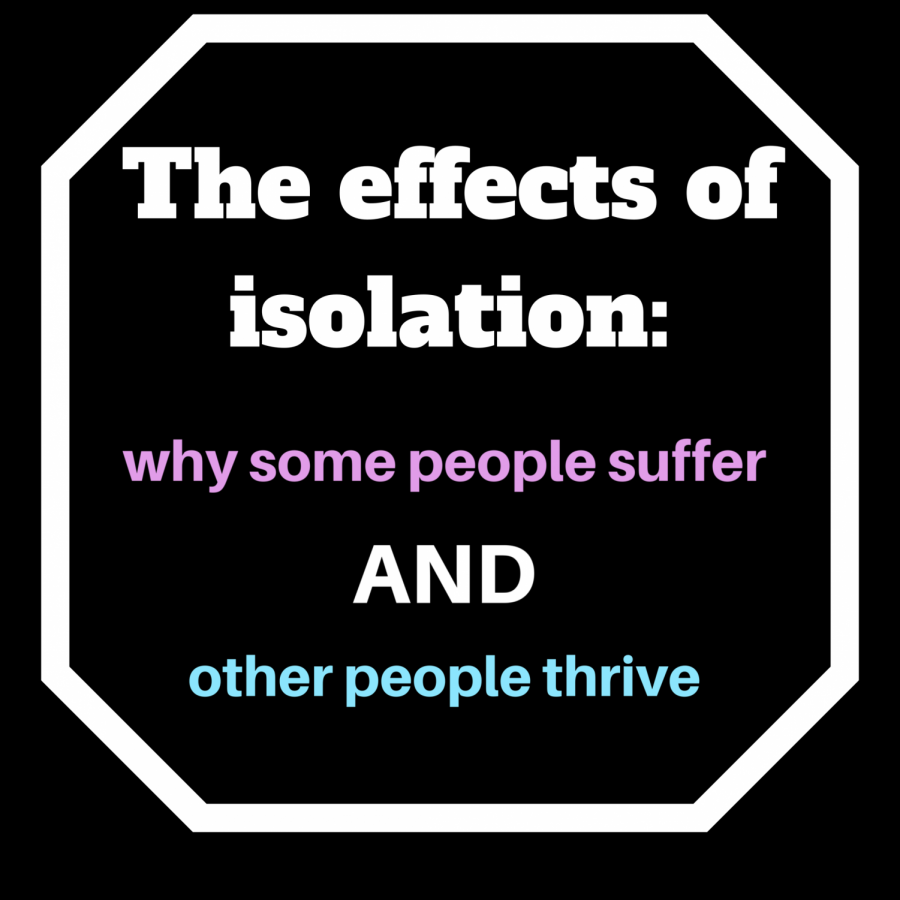The Effects of Isolation: why some people suffer while others thrive due to Social Distancing
Social isolation during the COVID-19 crisis is bringing some enjoyment, while others misery.
“Social distancing” and “Self-quarantine” are the new temporary lifestyle in the wake of the Coronavirus. While we all know that this separation is for the best, it doesn’t make it any easier to have a routine so drastically thrown off. For some, the effects are going beyond just boredom and feel more like solitary confinement. Yet, on the other hand, some people seem to be loving the alone time. Does it just boil down to introverts versus extroverts? Or do the effects of isolation and solitude lead deeper within us?
Biologically, humans are social creatures, meaning we thrive in groups and rely on each other to survive. It makes perfect sense-from the dawn of humanity there was strength in numbers. As we evolved, our brains became more and more intricately wired to encourage social interaction and depend upon it thanks to the laws of natural selection; those who were around others survived. Although we live in a time where people could sustain their own life without the help of others to hunt food and provide warmth, it is still an instinctual necessity that we have people close to us that we can rely on for biological as well as emotional needs. So much so that our body is keenly aware when we don’t, and the stress it puts on our bodies can have extremely detrimental effects. Isolation can increase the risk of stroke, immune suppression, high blood pressure and heart attack, according to aginglifecarejournal.org.
However, most of these physical effects stem from one powerful mental effect: loneliness. Studies of prisoners who spent extended periods of time in solitary confinement report experiencing intense anxiety and paranoia, and were much more susceptible to experience psychotic breaks, hallucinations and attempt suicide (according to Psychology Today). Although the current level of social distancing is not as intense as solitary confinement, the negative mental effects can still be seen as increased anxiety and depression in some.
While many around the globe are struggling with having so much alone time, it’s likely you’ve come across a person or two who seem to be having the time of their life. They couldn’t be happier to have an excuse to spend extended periods of time all by themselves. Why certain people develop this way and others don’t, can never be said for sure. However, it likely ties back to childhood in most people. If you enjoyed playing by yourself more often than with other kids, this behavior never really changes. Throughout history, there have been plenty of examples of people who loved their alone time. One day in the ‘80s, a man named Christopher Knight walked off into the Maine wilderness and stayed there—for 27 years. He only interacted with one other person during those close to three decades in the woods and was only discovered once residents of nearby towns noticed their property was being burgled. Loners get a bad rap in society. They can be seen as eccentric freaks who are rejected by society or hate it. While this may apply for rare cases like the Unabomber, more often than not the ability to be alone and not feel lonely is one of the most powerful skills a person can have.
People who enjoy being alone often have better mental health. They don’t experience “fomo” as intensely as some other people may and are more grounded. Spending time alone without distractions is shown to drastically increase creativity, focus, and productivity. And even if you love people, spending time alone can make you a better person for those around you. One learns to establish firm boundaries, increase self-awareness and reflection, and be more loyal.
So learning to be alone—and liking it—isn’t all the bad after all, and it’s definitely not impossible. Listen to yourself: what do you want to do? What thoughts and actions make you happy? Can you be your own best friend? The more a person can enjoy spending time with themselves, the better their relationship with themselves becomes, which ends up decreasing insecurity while increasing self-acceptance, self-reliance, self-worth, and so on. Take this once in a lifetime opportunity to not only get to know yourself better, but enjoy hanging out with yourself, too. There is enormous value in having other people around, but it’s just as important to balance that out with valuing yourself. After all, the only person you’re guaranteed to have around for the rest of your life is you.



carol Bailey • Mar 10, 2021 at 1:01 pm
I believe there are other factors that determine how well people do when they are isolated. The main one is the degree of choice people have. If it is your choice to be isolated, and under your control to break the isolation at some point, you can handle being isolated much better. It is a matter of autonomy. Your perceived control over your situation. It also depends on the context of your larger life. If you have a support network of a few or even one intimate friend who you can and do have predictable contact with (phone or Zoom etc.) it is much easier to experience prolonged periods of physical isolation. Your physical health also plays a part, including age. Many seniors in their later years are quite frail and already experiencing health issues related to chronic pain, mobility, diabetes, cardio vascular issues and so on. When you are experiencing pain and difficulty moving about and caring for your own basic needs, life alone can be difficult. You do not have the physical help that could make your life easier and you worry about being able to care for yourself. And one more thing…cognitive decline. It is well known that a lack of social interaction with others contributes to cognitive decline and this is also of greater concern in older adults, especially over 80.